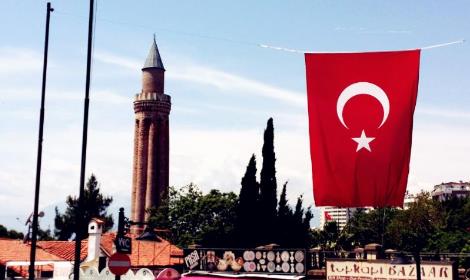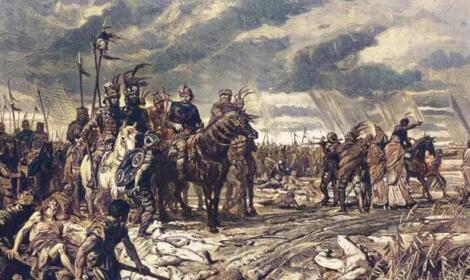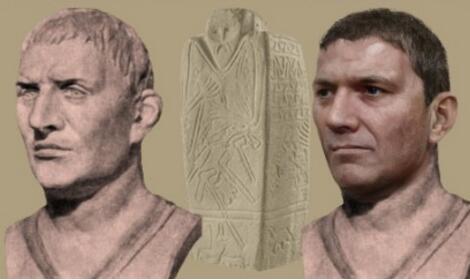如果他们的大汗没有死,蒙古人是否会征服欧洲?
正文翻译

Would the Mongols have conquered Europe if their Great Khan hadn't died?
如果他们的大汗没有死,蒙古人是否会征服欧洲?

Would the Mongols have conquered Europe if their Great Khan hadn't died?
如果他们的大汗没有死,蒙古人是否会征服欧洲?
评论翻译
Susanna Viljanen
Works at Aalto University
No.
The main reason is logistics. The winter 1241–1242 had been extremely cold and bitter and spring 1242 was wet. The result was that the whole Pannonian plain was basically one big lake of sludge and mud.
The Mongol logistics were based on foraging, and the formidable speed of the Mongol advance was actually its existence pre-requisite. The Mongol army had to be continuously on the move lest it starved. Its logistics were based on foraging. Each warrior had 5 to 10 spare mounts, and horses eat… like horses.
Remember the Pannonian plain was one big lake of sludge and mud? It meant nothing forageable was there to forage. The mounts and men starved, and the Mongols, while having had devastated the Hungarian countryside, had not managed to capture one single stone castle nor fortified town, and King Bela IV was still uncaptured.
Batu was not stupid. He realized the Europeans had not been a pushover. Both Liegnitz and Mohi had been close calls, the Hungarians had managed to cause several setbacks on smaller conflicts, the Poles had won the Battle of Racibórz and Duke Mieszko the Fat was still uncaptured - and he knew how to fight the Mongols. The original four tumens had thinned down to two.
不会。
主要原因是后勤。1241-1242年的冬天极其寒冷刺骨,1242年的春天又很潮湿。其结果是,整个潘诺尼亚平原基本上是一个由污泥和泥浆组成的大湖。
蒙古人的后勤保障是以觅食为基础的,而蒙古人前进的可怕速度实际上是其存在的前提条件。蒙古军队必须不断地移动,否则就会挨饿。它的后勤保障是以觅食为基础的。每个战士都有5到10匹备用坐骑,而马的食物......就像马需要的一样。
还记得潘诺尼亚平原是一个由淤泥和泥浆组成的大湖吗?这意味着那里没有可供采食的东西。坐骑和士兵都在挨饿,而蒙古人虽然摧毁了匈牙利的乡村,但却没能设法攻占一座石头城堡或设防的城镇,贝拉四世国王仍未被俘。
拔都并不愚蠢。他意识到,欧洲人并不是好欺负的。利格尼茨和莫希都曾险象环生,匈牙利人在较小的冲突中成功地造成了蒙古人的几次挫折,波兰人赢得了拉齐博尔茨战役,胖子米什科公爵仍然没有被俘虏--他知道如何与蒙古人作战。原来的四个图门已经减弱到两个。
Moreover, Europe was now on rage. The Pope preached for crusade against the Mongols. They were entering in terrain which did not favour the light horse tactics. And most of all, they were entering the most densely fortified area in the world. Germany alone had 60,000 castles in the 13th century - each being a potential metastasis of guerrilla raids. Europeans knew exactly how to fight steppe raiders - they had some 1,000 years of experience on that, and the keyword was area denial. Castles and fortifications are means of area denial.
If the Europeans knew one style of warfare, it was fortifications and area denial. It took the Mamluks over 30 years to drive the Franks off Palestine.
Batu also knew Europe was not an empire - a monolithic organism - but rather a network of small feudal states, which all were joined together by means of religion, marriages and fealty. He knew he had to win all the armies one by one, and even one defeat would have meant a complete catastrophe. It is far easier to defeat an empire (organism) than a feudal state (network). The Northern Polish army was still undefeated, as were Bohemian, Moravian, Austrian and Croatian armies. And they were now entering in terrain which favoured their style of warfare - and the atrocities of the Mongols and the fact they were Heathens - had evoked hatred and rage (remember the ‘dao’ by Sunzi?) amongst them.
此外,欧洲现在正处于愤怒之中。教皇宣称要对蒙古人进行十字军东征。他们进入的地形不利于采用轻骑兵战术。最重要的是,他们正在进入世界上防御最密集的地区。仅德国在13世纪就有6万座城堡--每一座都是游击队袭击的潜在转移点。欧洲人完全知道如何打击草原突袭者--他们在这方面有大约1000年的经验,而关键词是区域拒止。城堡和防御工事是区域拒止的手段。
如果说欧洲人了解哪一种战争方式,那就是工事防御和区域封锁。马穆鲁克人花了30多年才把法兰克人赶出巴勒斯坦。
拔都也知道欧洲不是一个帝国--一个整体的有机体--而是一个由小的封建国家组成的网络,这些国家都是通过宗教、婚姻和封建的方式联系在一起的。他知道他必须逐一赢得所有的军队,即使是一次失败也会意味着一场彻底的灾难。打败一个帝国(有机体)远比打败一个封建国家网络容易。北方的波兰军队仍未被击败,波希米亚、摩拉维亚、奥地利和克罗地亚的军队也是如此。而且他们现在进入的地形有利于他们的战争风格--蒙古人的暴行和他们是异教徒的事实--在他们中间唤起了仇恨和愤怒(还记得孙子的'道'吗)。
Batu was not stupid. While he had heard of death of Ögödei already in December 1241, he called it quits only in June 1242, used the kurultai as a handy excuse, called it quits and harvested the fruits of victory. It was better to leave as an undefeated conqueror - than to risk everything and suffer a catastophic defeat.
When the Mongols returned, the Europeans took absolutely no chances. They now knew who their enemy was and which was his modus operandi. The keywords for victory were area denial, scorched earth, right terrain for battle, castles, knights and crossbows. After the defeats in Hungary 1285 and Poland 1287 Mongols never were a problem in Europe anymore.
拔都并不愚蠢。虽然他在1241年12月就听说了窝阔台的死讯,但他在1242年6月才叫停,把库里尔台大会作为一个方便的借口,叫停并收获了胜利的果实。作为一个不败的征服者离开,总比冒着一切风险,遭受一场灾难性的失败要好。
当蒙古人再次回来的时候,欧洲人绝对不抱任何侥幸心理。他们现在知道了他们的敌人是谁,以及他的行动方式是什么。胜利的关键词是区域拒止、焦土、正确的战斗地形、城堡、骑士和弓箭。在1285年匈牙利和1287年波兰的战败后,蒙古人在欧洲再也不是一个问题了。
Will Suh
In short, yes.
1. Rebuttal to the argument that extensive European fortification would save them:
Europe had thousands of fortifications, but majority of these were ‘castles’, not fortified cities, which are fundamentally different. Feudal Europe was highly decentralized, and majority of civilian population apart from a handful of major cities were unprotected in 1200s. While castles might be great defensive structures for protection of noblemen and military units, it does not protect civilian populations from devastation. Thus however good European fortification may be, hardly matters. If Mongols were determined enough to conquer Europe, they would choose to ignore European fortifications and simply burn the entire European lands down to the last grain of crop, starving the population slowly.
Identical scenario occurred in Korea, which managed to resist Mongols for 28 years through 7 separate invasions. This feat was achieved by Koreans relocating the entirety of its government and urban populace to FORTIFIED ISLAND. The island itself was impossible for Mongols to access in the first place due to lack of naval technology, but the Koreans constructed multiple layers of wall around the perimeter just in case. However Mongols simply adopted long term war strategy of starving the entire country through complete destruction of agricultural productivity, and resorted to slaughtering Korean civilian populations in the countrysides until Koreans sued for peace.
Had Mongols chose to devote entirety of its resources and military for conquest of Europe across periods spanning decades, same would have likely happened.
简而言之,是的。
1. 对欧洲广泛的防御工事会拯救他们的论点进行反驳。
欧洲有数以千计的防御工事,但其中大部分是"城堡",而不是设防的城市,这两者有本质的区别。封建的欧洲是高度分散的,除了少数几个主要城市外,大多数平民在1200年代是不受保护的。虽然城堡可能是保护贵族和军事单位的伟大防御结构,但它并不能保护平民免受破坏。因此,无论欧洲的防御工事有多好,都不重要。如果蒙古人有足够的决心征服欧洲,他们会选择无视欧洲的防御工事,直接把整个欧洲的土地烧得只剩下最后一粒庄稼,让民众慢慢挨饿。
同样的情况发生在朝鲜,朝鲜面对7次单独的入侵,成功抵抗了蒙古人28年。这一壮举是通过朝鲜人将其政府和城市人口全部迁移到坚固的岛屿实现的。由于缺乏海军技术,蒙古人首先不可能进入该岛,而且朝鲜人在周边建造了多层围墙,以备不时之需。然而,蒙古人采取了长期的战争策略,通过完全破坏农业生产力来使整个国家挨饿,并诉诸于在农村屠杀朝鲜平民,直到朝鲜人提议和平。
如果蒙古人选择将其全部资源和军事力量用于征服欧洲,时间跨度达数十年之久,同样的情况也可能发生。
2. Rebuttal to the argument that the geography of Western Europe would save them:
The argument that Mongol warfare was only adapted to the wide open plain and cavalry warfare, is completely false. By the time of conquest of China, Mongol army long evolved past simple ‘nomadic cavalry units’, as many parts of terrain in western, central, and south eastern parts of China are highly mountainous. Mongols even managed to subjugate Tibetans which are located on THE HIMALAYAS. Obviously no cavalry based army or tactics was used for such a feat, but infantry units specialized for warfare in mountainous regions. Mongols very quickly learned military tactics of the conquered civilizations, and Southern and Southwestern Chinese were masters of combat in mountainous or heavily forested geography.
2. 对"西欧的地理环境会拯救他们"这一说法的反驳。
认为蒙古人的战争只适应于宽阔的平原和骑兵战的说法,是完全错误的。到了征服中国的时候,蒙古军队早已进化得不再是简单的"游牧骑兵部队",因为中国西部、中部和东南部的许多地方的地形都是大量的山区。蒙古人甚至设法征服了位于喜马拉雅山上的西藏人。显然,这样的壮举没有使用骑兵的军队或战术,而是使用了专门在山区作战的步兵部队。蒙古人很快就学会了被征服文明的军事战术,而中国南方和西南地区则是在山区或森林密布的地理环境中作战的高手。
3. Rebuttal to the argument that Western European military tactics would save them:
It is highly doubtful these Western European knights and bowmen can fare well against Mongol-Chinese military tactics during that era, which would be unlike any they faced in conventional European warfare. Subotai himself was an expert in Eastern military strategies, and it is completely conceivable that he could have defeated Holy Roman Empire had Ogedei Khan not died. Many include underhanded tactics such as various diversion and guerilla tactics, ambushes, elaborate traps, feigning attacks and retreats, and other psychological warfare as well as strategies that often take advantage of different geographical features.
Western Europe was centuries behind the East in terms of military strategies. Over a millennia before Western Europe even existed, many of top Han military strategists such as Zhuge Liang used all of these tactics very effectively to decisively defeat much larger armies using smaller forces. Many of these military tactics have withstood the test of time, and have been widely employed by the Imperial Japan during WW2, and are even taught in modern U.S. military academies as well. If Western Europeans expect a 'fair fight' with the enemy using strength and military might, they will be mistakened.
3. 对西欧军事战术可以拯救他们的论点进行反驳。
这些西欧骑士和弓箭手能否在那个时代的蒙汉军事战术面前表现出色是非常值得怀疑的,这与他们在传统欧洲战争中面临的任何战术都不一样。速不台本人是东方军事战略的专家,完全可以想象,如果窝阔台汗没有死,他是可以打败神圣罗马帝国的。许多策略包括暗渡陈仓,如各种声东击西和游击战术、伏击、精心设计的陷阱、佯装进攻和撤退等心理战,以及经常利用不同地理特征的策略。
在军事战略方面,西欧比东方落后几个世纪。在西欧出现之前的一千多年里,许多顶级的汉族军事战略家,如诸葛亮,非常有效地使用了所有这些战术,用较小的力量决定性地击败了大得多的军队。其中许多军事战术经受住了时间的考验,并在二战期间被日本帝国广泛采用,甚至在现代美国军事学院也有教授。如果西欧人期望用实力和军事力量与敌人进行"公平战斗",他们就错了。
YuChen Chen
Sorry, but using Korea as an argument for fortifications is a horrible example. The Mongols typically did well in terrains that favored them. Just look at their wars with the Song Dynasty. The Song Dynasty was absolutely horrible on the battlefield, yet a combination of unfavorable terrains and strong fortifications such as Diaoyu and Xiangyang held the Mongols at bay for decades.
The Mongols only managed to conquer Southern China by employing overwhelming amounts of troops and resources from Northern China. The same could be said of Korea, as it was incredibly close to the Mongols center of power.
Now the same cannot be said of the Europe. Just look at the geography and you’ll see that the Mongols had none of the populated resource rich regions that they could draw from in order to attack Europe. Using subjective reasoning such as Eastern Strategies is ‘better’ than Western strategies completely ignores all the logistical and terrain nightmares the Mongols would have to invest in order to subjugate Europe
抱歉,但使用朝鲜作为防御工事的论据是一个糟糕的例子。蒙古人通常在有利于他们的地形上表现出色。看看他们与宋朝的战争。宋朝在战场上的表现绝对是惨不忍睹的,但通过利用不利于蒙古人的地形,再加上钓鱼台、襄阳等坚固工事,数十年来蒙古人一直处于困境之中。
蒙古人只能通过从中国北方使用大量的军队和资源来征服中国南方。朝鲜也是如此,因为它非常接近蒙古的权力中心。
但是对欧洲却不能这么说。只要看看地理,你就会发现蒙古人没有一个人口密集的资源丰富的地区可以用来攻击欧洲。使用诸如东方战略比西方战略“更好”之类的主观推理完全忽略了蒙古人为了征服欧洲而必须面对的所有后勤和地形噩梦。
Susanna Viljanen
Re-rebuttals:
There were some 60,000 castles and fortified towns in Germany alone in th3 13th century. If the Europeans excelled in any kind of warfare, it was the fortifications. The Mongols were unable to take any castles or fortified cities in Hungary 1241–1242. The Mongols lacked siege equipment - and even with siege gear, conquering a castle or a fortified town was always risky. Pestilence could easily spread amongst the besiegers, or an outside army could attack him. According to Sunzi, attacking fortifications is the worst kind of warfare imaginable. Ignoring a fortification meant there was a base for guerrilla warfare and checauchees behind one’s back. Not a good idea.
Tibet is mainly plateau - it is only surrounded by mountaisn but it is not a mountaineous land. the Mongols were on their own od flat plateau and steppes, but not in Central European terrain - densely inhabitated, broken, with woods, lakes, rivers, hills, orchards and mountains everywhere. The terrain favours heavy cavalry and not light. When the Mongols attempted to conquer Europe for the first time, they had not learned the methods yet. When they returned, they failed. The Europeans had learned also how to fight the Mongols.
对你的反驳的反驳:
1 在13世纪,仅在德国就有大约6万座城堡和设防城镇。如果说欧洲人会在哪一种战争中表现出色,那就是工事防御战。蒙古人在1241-1242年没有办法攻占匈牙利的任何城堡或设防城市。蒙古人缺乏攻城设备--即使有攻城设备,征服城堡或设防的城镇也总是有风险的。瘟疫很容易在围攻者中传播,或者外围军队可能会攻击他。根据孙子的说法,攻击防御工事是可以想象得到的最糟糕的一种战争行动。而忽视一个工事意味着背后有一个游击战的基地。这不是一个好主意。
2 西藏主要是高原--它只是被山脉包围着,但它不是一个山区。蒙古人自己在他们平坦的高原和草原上已经习惯了,但在中欧的地形却不是如此--居民密集,破碎,到处是树林,湖泊,河流,山丘,果园和山脉。这种地形有利于重骑兵而不是轻骑兵。当蒙古人第一次试图征服欧洲时,他们还没有学会针对这种地形的方法。当他们回来时,他们失败了。欧洲人也已经学会了如何与蒙古人作战。
The Polish and Hungarian armies defeated the invasions of 1285–1286, which were far stronger than those of 1241–1242. It is all about generalshp. A combined arms army consisting of knights and infantry archers is a formidable weapon in the hands of a knowledgeable general. Moreover, the Mongols had already suffered heavy casualties in the 1241–1242 invasions - the battles of Liegnitz and Mohi appear to have been close runs - and the original four tumens had been badly eroded with only some 20 0000 men left in 1242. The Europeans had proved far rougher nut than Subudei had thought - and they had not even advanced to the European heavily fortified heartlands. Baidar and Berke would have liked to continue the conquest, but Batu voted against. The Mongols had conquered Hungary but not subjugated it: the towns and castles remained unconquered and the Hungarians were on guerrilla war based on the castles. The Mongols had logistical problems with foraging fodder for the horses. It is likely they would have returned even without Ögödei’s death; they were demoralized.
The Mongols retrurned four decades later,invading both Poland and Hungary, but this time the Europeans had learned on hoqw to fight the Mongols. The key word was “generalship”. The later Hungarian armies consisted more of heavy knights and heavy foot than the earlier (which were basically semi-nomadic light horse armies) and clwever use of terrain brought the victory in the battle of Pest 1285. See Second Mongol invasion of Hungary - Wikipedia
3 波兰和匈牙利军队击败了1285-1286年的入侵,这一次入侵比1241-1242年的入侵强大得多。这主要是将军的问题。一支由骑士和步兵弓箭手组成的联合军队在知识渊博的将军手中是一种可怕的武器。此外,蒙古人在1241-1242年的入侵中已经伤亡惨重--列格尼茨战役和莫希战役似乎都是险象环生--原来的四支图门(万户)已经被严重消耗,到1242年只剩下大约20000人。事实证明,欧洲人比速不台想象的要强硬得多--他们甚至还没有推进到欧洲重兵防守的中心地带。拜答尔和伯克本想继续征服,但拔都投票反对。蒙古人击败了匈牙利,但没有征服它:城镇和城堡仍然没有被征服,匈牙利人在城堡的基础上开展游击战。蒙古人在为马匹觅食饲料时遇到了后勤问题。即使没有窝阔台的死亡,他们也很可能也会返回;他们士气已经很低落。
4 四十年后,蒙古人卷土重来,入侵波兰和匈牙利,但这一次,欧洲人学会了如何与蒙古人作战。关键字是"将领"。后来的匈牙利军队比早期的军队(基本上是半游牧的轻骑兵)更多地由重装骑士和重装步兵组成,并且藉由对地形的利用带来了1285年佩斯之战的胜利。见:蒙古人对匈牙利的第二次入侵 - 维基百科
Ren
They did have sucess in Poland and Hungary but from what I read faced great resistance in Bohemia, Croatia, and vienna which were all heavily fortified. Even if they took over Eastern Europe I can't seem the taking over western Europe.
他们确实在波兰和匈牙利取得了成功,但从我读到的内容来看,他们在波西米亚、克罗地亚和维也纳都面临着巨大的阻力,这些地方都有很强的防御能力。即使他们占领了东欧,我也不认为他们能占领西欧。
Arthur Gao
And they had no need to. Europe was of very little importance after the split of the empire
他们也没有必要这样做。帝国分裂后,欧洲已经不重要了
Aaron Wood
Why invade eastern Europe then? It’s true that Europe was a dump compared to China and Persia, but even back in the Middle Ages, eastern Europe was poor relative to west-central Europe which was on the rebound at the time of the invasion. The reality is that the Mongols simply couldn’t fight in the forests, and they had the resistance of the Holy Roman Empire which proved to be too much of a challenge for what it was worth.
那为什么要入侵东欧?与中国和波斯相比,欧洲确实是个鬼地方,但即使在中世纪,东欧相对于入侵时正处于回升期的中西部欧洲来说也是很穷的。现实情况是,蒙古人根本无法在森林中作战,而且他们还面临神圣罗马帝国的抵抗,事实证明这对他们来说是个太大的挑战。
Sunwoo Yang
The mongols have proven that they can take conquered people and turn their advantages against them. Mongols learned siege warfare way before they reached Europe.
蒙古人已经证明,他们可以把被征服的人,把对方的优势转化为对他们的优势。蒙古人在到达欧洲之前就已经学会了攻城战。
Ren
Do you think they could of taken over western Europe? They best hungry and Poland but I know they had some trouble in Austria
你认为他们能占领西欧吗?他们击败了匈牙利和波兰,但我知道他们在奥地利遇到了一些麻烦。
Dave D
Not sure where you are getting “1285–1286, which were far stronger than those of 1241–1242” From my research the opposite seems to be true.
不知道你从哪里得到的"1285-1286年的入侵远比1241-1242年的强"的说法,从我的研究来看,情况似乎正好相反。
Denis Barišić
Point 1:
There is a difference between destroying the agriculture of a single part of one undefended kingdom, and a whole continent.
Point 2:
You are using a really bad example. The Mongols never “conquered” Tibet in the traditional sense. They didn’t march a huge army into it and capture city after city, because Tibet wasn’t a threat, so essentially all they did was scare them into paying tribute and being nominally under Mongol rule. There were no big battles and resistance in Tibet. In foreign places where they did meet resistance, like Vietnam and Europe, they failed to achieve their goals.
Point 3:
This must be a joke. No, Europe wasn’t centuries behind the East when it comes to strategy. Literally every tactic you mentioned was used for thousands of years in Europe and the Middle East by that time. What you said in this point is about 100% false, with not a grain of truth to it.
There was simply no chance that the Mongol Empire could reach even into Central Europe, never mind the Atlantic ocean. They would simply get curb stomped by the European heavy infantry and knights.
第1点:
摧毁一个不设防王国的农业,与摧毁整个大陆是有区别的。
第2点:
你用的是一个非常糟糕的例子。蒙古人从未在传统意义上"征服"过西藏。他们没有将一支庞大的军队开进西藏,占领一个又一个城市,因为西藏并不构成威胁,所以基本上他们所做的只是吓唬他们交纳贡品,在名义上接受蒙古人的统治。在西藏没有发生大的战役和抵抗。在他们确实遇到抵抗的外国地方,如越南和欧洲,他们未能实现其目标。
第3点:
这一定是个笑话。不,在战略方面,欧洲并没有落后东方几个世纪。从字面上看,你提到的每一种战术在当时的欧洲和中东地区已经使用了几千年了。你在这一点上所说的是100%的错误,没有一丝的真实性。
蒙古帝国根本没有机会进入中欧,更不用说进入大西洋了。他们只会被欧洲的重装步兵和骑士们踩在脚下。
Fransiska Swan
you brought ire of eurocentric history fans upon yourself. they never even can think about superior anglo saxon aryan race can be defeated by other races’.
你把欧洲中心主义的历史爱好者的愤怒惹到了自己身上。他们甚至从来没有想过优越的盎格鲁撒克逊雅利安人种可以被其他种族打败'。
no u
I agree, history told to us is often extremely eurocentric. I like to remind people that in the 13th century, china was by far the most powerful empire the world had ever seen with some of the most advanced battle tactics, medicines and gunpowder technology. Heck, even the earliest forms of paper originated from china. When the mongols invaded the Jin dynasty of Northern china with 90000 men, the Jin dynasty with only northern china under their control at the time mobilized over 800000 soldiers in retaliation, probably more than what 95% of europe could muster, granted most soldiers recruited were untrained. Another thing i would like to remind everyone is that a united china is nothing to laugh at, throughout the thousands of years of human civilization, china has almost always topped the charts in wealth, technology and population, It was only around the time of the age of discovery that the Europeans utilized Chinese technology to create more advanced guns and cannons after which they went around killing the hundreds of thousands of natives of the colonies that they “discovered”
我同意,现在灌输给我们的历史往往是极其以欧洲为中心的。我喜欢提醒人们,在13世纪,中国是当时世界上最强大的帝国,拥有一些最先进的战斗战术、医药和火药技术。不仅如此,甚至最早的纸张形式也源自中国。当蒙古人以9万人入侵中国北部的金朝时,当时只控制着中国北部的金朝动员了超过80万名士兵进行报复,可能比95%的欧洲军队都要多,当然大多数被招募的士兵都没有经过训练。我想提醒大家的是,一个统一的中国不是一个笑话,在几千年的人类文明中,中国几乎总是在财富、技术和人口方面名列前茅,只是在发现时代前后,欧洲人利用中国的技术制造了更先进的枪支和大炮,然后他们四处屠杀他们"发现"的殖民地的数十万土著人。
Dave D
The Mongols were considerably more mobile than any European army of the time. Ultimately they could dictate the terms of battle because of this. They could flee when a situation wasn’t in their favor and destroy the European country side there by starving the civilian population. While it would have been difficult, with enough time and a focus of resources they could have conquered all of Europe just as they did the Asia.
蒙古人的机动性比当时的任何欧洲军队都强得多。正因为如此,他们最终可以决定战斗的条件。当局势对他们不利时,他们可以逃跑,并通过饿死平民来摧毁欧洲国家。虽然这很困难,但只要有足够的时间和集中的资源,他们就能像征服亚洲那样征服整个欧洲。
Charles Johnson
Except they conquered most of what they did of Asia because of it’s terrain or scaring people into giving tribute.
Their attempted invasions of Japan and Vietnam were huge events in leading to the collapse of the Mongol empire. Poland and France sure, those were mostly favourable terrains, but Britain is an island, Germany and Switzerland are made of mountains, and Hungary has abrasive grass that’s really rough on horse feet. The mongols may have conquered huge chunks of Europe but just as they never conquered all of Asia I don’t see a version of history where they could have ever overcome all of Europe.
然而他们征服的亚洲大部分地区,都是因为那里的地形有利于他们或只是吓唬人们向他进贡。
他们对日本和越南的入侵企图是导致蒙古帝国崩溃的重大事件。波兰和法国的大部分地形当然是有利于他们的,但英国是一个岛屿,德国和瑞士是由山脉组成的,匈牙利有粗粝的草丛,对马的脚很不利。蒙古人可能可以征服欧洲一大片地方,但就像他们从未征服过整个亚洲一样,我不认为他们有可能征服整个欧洲。
Syarif Mirza
Had the Mongols been more dedicated to conquer Europe and Subutai was leading them, then I dont see how most or arguably all of europe would've been conquered. The European forests are nothing special compared to the malaria-infested, thick tropical jungles/rainforests, mountainous regions (e.g; Caucasus, Afghanistan)& extreme cold areas like in Russia. European castles are also not as sturdy as the ones in China where the Mongols have been shown to breach let alone weaker castles in europe
如果蒙古人更专注于征服欧洲,并且由速不台领导他们,那么我看不出大部分或可以说全部欧洲如何不会被征服。欧洲的森林与疟疾肆虐、茂密的热带丛林/雨林、山区(如高加索、阿富汗)以及像俄罗斯这样的极寒地区相比,并无特别之处。欧洲的城堡也不如中国的城堡坚固,因为蒙古人对中国城堡都可以攻破,更不用说欧洲的弱小城堡了。
Gary Bradski
The Mongol invasion of Europe absolutely did not turn back because of the death of the Great Khan. Batu didn’t even hear about if for about a year. He fled because the climate sweet spot that allowed the great Mongol invasions had changed. By Hungary, they couldn’t forage their horses and essentially fled starving. Europe is heavily fortified, disconnected and mountainous allowing for ambush. The Europeans already had the first shock and awe where they were soundly beat, but were learning and adapting — the Mongols conquered no fortified cities in Hungary and did try to starve out the country, but they were the ones that ended up starving. The Mongols were starting to get a string of losses in Europe by ambush, lack of mobility etc. They were taking heavy numerical loss which was depleting them. I think Mongols reached their natural extent of projection. Europe was too far AND of the wrong terrain for the forces they could project through. The weather that had enabled the original expansion had turned.
蒙古人对欧洲的入侵绝对不是因为大汗的死亡而折返。死讯传到拔都那里甚至都过了一年左右了。他之所以逃离,是因为允许蒙古人大举入侵的气候甜蜜点已经改变。到了匈牙利,他们无法喂养马匹,基本上是饿着肚子逃走的。欧洲戒备森严,四通八达,多山,利于伏击。欧洲人已经经历了第一次接触被打得落花流水的震慑,正在学习和适应--蒙古人在匈牙利没有征服任何坚固的城市,确实试图饿死这个国家,但最后饿死的是他们。蒙古人开始在欧洲因伏击、缺乏机动性等原因而遭受一连串的损失。他们在数量上损失惨重,这使他们疲于奔命。我认为蒙古人达到了他们的自然投射范围。欧洲太远了,而且对于他们可以投射的部队来说,地形也不利。并且使得最初的扩张得以进行的天气也已经改变。
Carlo Caguioa
Deep Forrest is not enough to stop the mongols, they have fought through tougher terrains, [[battle of Caucasus mountain]] showed how the mongols took care of their horses with very little leaves to feed their horses and still beat a coalition outnumbered 2 to 1 through a mountain pass. Western Europe have a lot of leaves and branches to feed all of the mongol horses far from the difficult terrain of [[tien shen]] mountains and [[caucasus mountains]]
黑森林不足以阻止蒙古人,他们曾在更艰难的地形上作战,[[高加索山之战]]展示了蒙古人如何用很少的树叶来喂养他们的马匹,并且仍然通过山口击败了人数为比2比1的联盟。西欧有大量的树叶和树枝来喂养所有的蒙古马,地形方面的困难更是远不及[[天山]]和[[高加索山]]的地形。
Works at Aalto University
No.
The main reason is logistics. The winter 1241–1242 had been extremely cold and bitter and spring 1242 was wet. The result was that the whole Pannonian plain was basically one big lake of sludge and mud.
The Mongol logistics were based on foraging, and the formidable speed of the Mongol advance was actually its existence pre-requisite. The Mongol army had to be continuously on the move lest it starved. Its logistics were based on foraging. Each warrior had 5 to 10 spare mounts, and horses eat… like horses.
Remember the Pannonian plain was one big lake of sludge and mud? It meant nothing forageable was there to forage. The mounts and men starved, and the Mongols, while having had devastated the Hungarian countryside, had not managed to capture one single stone castle nor fortified town, and King Bela IV was still uncaptured.
Batu was not stupid. He realized the Europeans had not been a pushover. Both Liegnitz and Mohi had been close calls, the Hungarians had managed to cause several setbacks on smaller conflicts, the Poles had won the Battle of Racibórz and Duke Mieszko the Fat was still uncaptured - and he knew how to fight the Mongols. The original four tumens had thinned down to two.
不会。
主要原因是后勤。1241-1242年的冬天极其寒冷刺骨,1242年的春天又很潮湿。其结果是,整个潘诺尼亚平原基本上是一个由污泥和泥浆组成的大湖。
蒙古人的后勤保障是以觅食为基础的,而蒙古人前进的可怕速度实际上是其存在的前提条件。蒙古军队必须不断地移动,否则就会挨饿。它的后勤保障是以觅食为基础的。每个战士都有5到10匹备用坐骑,而马的食物......就像马需要的一样。
还记得潘诺尼亚平原是一个由淤泥和泥浆组成的大湖吗?这意味着那里没有可供采食的东西。坐骑和士兵都在挨饿,而蒙古人虽然摧毁了匈牙利的乡村,但却没能设法攻占一座石头城堡或设防的城镇,贝拉四世国王仍未被俘。
拔都并不愚蠢。他意识到,欧洲人并不是好欺负的。利格尼茨和莫希都曾险象环生,匈牙利人在较小的冲突中成功地造成了蒙古人的几次挫折,波兰人赢得了拉齐博尔茨战役,胖子米什科公爵仍然没有被俘虏--他知道如何与蒙古人作战。原来的四个图门已经减弱到两个。
Moreover, Europe was now on rage. The Pope preached for crusade against the Mongols. They were entering in terrain which did not favour the light horse tactics. And most of all, they were entering the most densely fortified area in the world. Germany alone had 60,000 castles in the 13th century - each being a potential metastasis of guerrilla raids. Europeans knew exactly how to fight steppe raiders - they had some 1,000 years of experience on that, and the keyword was area denial. Castles and fortifications are means of area denial.
If the Europeans knew one style of warfare, it was fortifications and area denial. It took the Mamluks over 30 years to drive the Franks off Palestine.
Batu also knew Europe was not an empire - a monolithic organism - but rather a network of small feudal states, which all were joined together by means of religion, marriages and fealty. He knew he had to win all the armies one by one, and even one defeat would have meant a complete catastrophe. It is far easier to defeat an empire (organism) than a feudal state (network). The Northern Polish army was still undefeated, as were Bohemian, Moravian, Austrian and Croatian armies. And they were now entering in terrain which favoured their style of warfare - and the atrocities of the Mongols and the fact they were Heathens - had evoked hatred and rage (remember the ‘dao’ by Sunzi?) amongst them.
此外,欧洲现在正处于愤怒之中。教皇宣称要对蒙古人进行十字军东征。他们进入的地形不利于采用轻骑兵战术。最重要的是,他们正在进入世界上防御最密集的地区。仅德国在13世纪就有6万座城堡--每一座都是游击队袭击的潜在转移点。欧洲人完全知道如何打击草原突袭者--他们在这方面有大约1000年的经验,而关键词是区域拒止。城堡和防御工事是区域拒止的手段。
如果说欧洲人了解哪一种战争方式,那就是工事防御和区域封锁。马穆鲁克人花了30多年才把法兰克人赶出巴勒斯坦。
拔都也知道欧洲不是一个帝国--一个整体的有机体--而是一个由小的封建国家组成的网络,这些国家都是通过宗教、婚姻和封建的方式联系在一起的。他知道他必须逐一赢得所有的军队,即使是一次失败也会意味着一场彻底的灾难。打败一个帝国(有机体)远比打败一个封建国家网络容易。北方的波兰军队仍未被击败,波希米亚、摩拉维亚、奥地利和克罗地亚的军队也是如此。而且他们现在进入的地形有利于他们的战争风格--蒙古人的暴行和他们是异教徒的事实--在他们中间唤起了仇恨和愤怒(还记得孙子的'道'吗)。
Batu was not stupid. While he had heard of death of Ögödei already in December 1241, he called it quits only in June 1242, used the kurultai as a handy excuse, called it quits and harvested the fruits of victory. It was better to leave as an undefeated conqueror - than to risk everything and suffer a catastophic defeat.
When the Mongols returned, the Europeans took absolutely no chances. They now knew who their enemy was and which was his modus operandi. The keywords for victory were area denial, scorched earth, right terrain for battle, castles, knights and crossbows. After the defeats in Hungary 1285 and Poland 1287 Mongols never were a problem in Europe anymore.
拔都并不愚蠢。虽然他在1241年12月就听说了窝阔台的死讯,但他在1242年6月才叫停,把库里尔台大会作为一个方便的借口,叫停并收获了胜利的果实。作为一个不败的征服者离开,总比冒着一切风险,遭受一场灾难性的失败要好。
当蒙古人再次回来的时候,欧洲人绝对不抱任何侥幸心理。他们现在知道了他们的敌人是谁,以及他的行动方式是什么。胜利的关键词是区域拒止、焦土、正确的战斗地形、城堡、骑士和弓箭。在1285年匈牙利和1287年波兰的战败后,蒙古人在欧洲再也不是一个问题了。
Will Suh
In short, yes.
1. Rebuttal to the argument that extensive European fortification would save them:
Europe had thousands of fortifications, but majority of these were ‘castles’, not fortified cities, which are fundamentally different. Feudal Europe was highly decentralized, and majority of civilian population apart from a handful of major cities were unprotected in 1200s. While castles might be great defensive structures for protection of noblemen and military units, it does not protect civilian populations from devastation. Thus however good European fortification may be, hardly matters. If Mongols were determined enough to conquer Europe, they would choose to ignore European fortifications and simply burn the entire European lands down to the last grain of crop, starving the population slowly.
Identical scenario occurred in Korea, which managed to resist Mongols for 28 years through 7 separate invasions. This feat was achieved by Koreans relocating the entirety of its government and urban populace to FORTIFIED ISLAND. The island itself was impossible for Mongols to access in the first place due to lack of naval technology, but the Koreans constructed multiple layers of wall around the perimeter just in case. However Mongols simply adopted long term war strategy of starving the entire country through complete destruction of agricultural productivity, and resorted to slaughtering Korean civilian populations in the countrysides until Koreans sued for peace.
Had Mongols chose to devote entirety of its resources and military for conquest of Europe across periods spanning decades, same would have likely happened.
简而言之,是的。
1. 对欧洲广泛的防御工事会拯救他们的论点进行反驳。
欧洲有数以千计的防御工事,但其中大部分是"城堡",而不是设防的城市,这两者有本质的区别。封建的欧洲是高度分散的,除了少数几个主要城市外,大多数平民在1200年代是不受保护的。虽然城堡可能是保护贵族和军事单位的伟大防御结构,但它并不能保护平民免受破坏。因此,无论欧洲的防御工事有多好,都不重要。如果蒙古人有足够的决心征服欧洲,他们会选择无视欧洲的防御工事,直接把整个欧洲的土地烧得只剩下最后一粒庄稼,让民众慢慢挨饿。
同样的情况发生在朝鲜,朝鲜面对7次单独的入侵,成功抵抗了蒙古人28年。这一壮举是通过朝鲜人将其政府和城市人口全部迁移到坚固的岛屿实现的。由于缺乏海军技术,蒙古人首先不可能进入该岛,而且朝鲜人在周边建造了多层围墙,以备不时之需。然而,蒙古人采取了长期的战争策略,通过完全破坏农业生产力来使整个国家挨饿,并诉诸于在农村屠杀朝鲜平民,直到朝鲜人提议和平。
如果蒙古人选择将其全部资源和军事力量用于征服欧洲,时间跨度达数十年之久,同样的情况也可能发生。
2. Rebuttal to the argument that the geography of Western Europe would save them:
The argument that Mongol warfare was only adapted to the wide open plain and cavalry warfare, is completely false. By the time of conquest of China, Mongol army long evolved past simple ‘nomadic cavalry units’, as many parts of terrain in western, central, and south eastern parts of China are highly mountainous. Mongols even managed to subjugate Tibetans which are located on THE HIMALAYAS. Obviously no cavalry based army or tactics was used for such a feat, but infantry units specialized for warfare in mountainous regions. Mongols very quickly learned military tactics of the conquered civilizations, and Southern and Southwestern Chinese were masters of combat in mountainous or heavily forested geography.
2. 对"西欧的地理环境会拯救他们"这一说法的反驳。
认为蒙古人的战争只适应于宽阔的平原和骑兵战的说法,是完全错误的。到了征服中国的时候,蒙古军队早已进化得不再是简单的"游牧骑兵部队",因为中国西部、中部和东南部的许多地方的地形都是大量的山区。蒙古人甚至设法征服了位于喜马拉雅山上的西藏人。显然,这样的壮举没有使用骑兵的军队或战术,而是使用了专门在山区作战的步兵部队。蒙古人很快就学会了被征服文明的军事战术,而中国南方和西南地区则是在山区或森林密布的地理环境中作战的高手。
3. Rebuttal to the argument that Western European military tactics would save them:
It is highly doubtful these Western European knights and bowmen can fare well against Mongol-Chinese military tactics during that era, which would be unlike any they faced in conventional European warfare. Subotai himself was an expert in Eastern military strategies, and it is completely conceivable that he could have defeated Holy Roman Empire had Ogedei Khan not died. Many include underhanded tactics such as various diversion and guerilla tactics, ambushes, elaborate traps, feigning attacks and retreats, and other psychological warfare as well as strategies that often take advantage of different geographical features.
Western Europe was centuries behind the East in terms of military strategies. Over a millennia before Western Europe even existed, many of top Han military strategists such as Zhuge Liang used all of these tactics very effectively to decisively defeat much larger armies using smaller forces. Many of these military tactics have withstood the test of time, and have been widely employed by the Imperial Japan during WW2, and are even taught in modern U.S. military academies as well. If Western Europeans expect a 'fair fight' with the enemy using strength and military might, they will be mistakened.
3. 对西欧军事战术可以拯救他们的论点进行反驳。
这些西欧骑士和弓箭手能否在那个时代的蒙汉军事战术面前表现出色是非常值得怀疑的,这与他们在传统欧洲战争中面临的任何战术都不一样。速不台本人是东方军事战略的专家,完全可以想象,如果窝阔台汗没有死,他是可以打败神圣罗马帝国的。许多策略包括暗渡陈仓,如各种声东击西和游击战术、伏击、精心设计的陷阱、佯装进攻和撤退等心理战,以及经常利用不同地理特征的策略。
在军事战略方面,西欧比东方落后几个世纪。在西欧出现之前的一千多年里,许多顶级的汉族军事战略家,如诸葛亮,非常有效地使用了所有这些战术,用较小的力量决定性地击败了大得多的军队。其中许多军事战术经受住了时间的考验,并在二战期间被日本帝国广泛采用,甚至在现代美国军事学院也有教授。如果西欧人期望用实力和军事力量与敌人进行"公平战斗",他们就错了。
YuChen Chen
Sorry, but using Korea as an argument for fortifications is a horrible example. The Mongols typically did well in terrains that favored them. Just look at their wars with the Song Dynasty. The Song Dynasty was absolutely horrible on the battlefield, yet a combination of unfavorable terrains and strong fortifications such as Diaoyu and Xiangyang held the Mongols at bay for decades.
The Mongols only managed to conquer Southern China by employing overwhelming amounts of troops and resources from Northern China. The same could be said of Korea, as it was incredibly close to the Mongols center of power.
Now the same cannot be said of the Europe. Just look at the geography and you’ll see that the Mongols had none of the populated resource rich regions that they could draw from in order to attack Europe. Using subjective reasoning such as Eastern Strategies is ‘better’ than Western strategies completely ignores all the logistical and terrain nightmares the Mongols would have to invest in order to subjugate Europe
抱歉,但使用朝鲜作为防御工事的论据是一个糟糕的例子。蒙古人通常在有利于他们的地形上表现出色。看看他们与宋朝的战争。宋朝在战场上的表现绝对是惨不忍睹的,但通过利用不利于蒙古人的地形,再加上钓鱼台、襄阳等坚固工事,数十年来蒙古人一直处于困境之中。
蒙古人只能通过从中国北方使用大量的军队和资源来征服中国南方。朝鲜也是如此,因为它非常接近蒙古的权力中心。
但是对欧洲却不能这么说。只要看看地理,你就会发现蒙古人没有一个人口密集的资源丰富的地区可以用来攻击欧洲。使用诸如东方战略比西方战略“更好”之类的主观推理完全忽略了蒙古人为了征服欧洲而必须面对的所有后勤和地形噩梦。
Susanna Viljanen
Re-rebuttals:
There were some 60,000 castles and fortified towns in Germany alone in th3 13th century. If the Europeans excelled in any kind of warfare, it was the fortifications. The Mongols were unable to take any castles or fortified cities in Hungary 1241–1242. The Mongols lacked siege equipment - and even with siege gear, conquering a castle or a fortified town was always risky. Pestilence could easily spread amongst the besiegers, or an outside army could attack him. According to Sunzi, attacking fortifications is the worst kind of warfare imaginable. Ignoring a fortification meant there was a base for guerrilla warfare and checauchees behind one’s back. Not a good idea.
Tibet is mainly plateau - it is only surrounded by mountaisn but it is not a mountaineous land. the Mongols were on their own od flat plateau and steppes, but not in Central European terrain - densely inhabitated, broken, with woods, lakes, rivers, hills, orchards and mountains everywhere. The terrain favours heavy cavalry and not light. When the Mongols attempted to conquer Europe for the first time, they had not learned the methods yet. When they returned, they failed. The Europeans had learned also how to fight the Mongols.
对你的反驳的反驳:
1 在13世纪,仅在德国就有大约6万座城堡和设防城镇。如果说欧洲人会在哪一种战争中表现出色,那就是工事防御战。蒙古人在1241-1242年没有办法攻占匈牙利的任何城堡或设防城市。蒙古人缺乏攻城设备--即使有攻城设备,征服城堡或设防的城镇也总是有风险的。瘟疫很容易在围攻者中传播,或者外围军队可能会攻击他。根据孙子的说法,攻击防御工事是可以想象得到的最糟糕的一种战争行动。而忽视一个工事意味着背后有一个游击战的基地。这不是一个好主意。
2 西藏主要是高原--它只是被山脉包围着,但它不是一个山区。蒙古人自己在他们平坦的高原和草原上已经习惯了,但在中欧的地形却不是如此--居民密集,破碎,到处是树林,湖泊,河流,山丘,果园和山脉。这种地形有利于重骑兵而不是轻骑兵。当蒙古人第一次试图征服欧洲时,他们还没有学会针对这种地形的方法。当他们回来时,他们失败了。欧洲人也已经学会了如何与蒙古人作战。
The Polish and Hungarian armies defeated the invasions of 1285–1286, which were far stronger than those of 1241–1242. It is all about generalshp. A combined arms army consisting of knights and infantry archers is a formidable weapon in the hands of a knowledgeable general. Moreover, the Mongols had already suffered heavy casualties in the 1241–1242 invasions - the battles of Liegnitz and Mohi appear to have been close runs - and the original four tumens had been badly eroded with only some 20 0000 men left in 1242. The Europeans had proved far rougher nut than Subudei had thought - and they had not even advanced to the European heavily fortified heartlands. Baidar and Berke would have liked to continue the conquest, but Batu voted against. The Mongols had conquered Hungary but not subjugated it: the towns and castles remained unconquered and the Hungarians were on guerrilla war based on the castles. The Mongols had logistical problems with foraging fodder for the horses. It is likely they would have returned even without Ögödei’s death; they were demoralized.
The Mongols retrurned four decades later,invading both Poland and Hungary, but this time the Europeans had learned on hoqw to fight the Mongols. The key word was “generalship”. The later Hungarian armies consisted more of heavy knights and heavy foot than the earlier (which were basically semi-nomadic light horse armies) and clwever use of terrain brought the victory in the battle of Pest 1285. See Second Mongol invasion of Hungary - Wikipedia
3 波兰和匈牙利军队击败了1285-1286年的入侵,这一次入侵比1241-1242年的入侵强大得多。这主要是将军的问题。一支由骑士和步兵弓箭手组成的联合军队在知识渊博的将军手中是一种可怕的武器。此外,蒙古人在1241-1242年的入侵中已经伤亡惨重--列格尼茨战役和莫希战役似乎都是险象环生--原来的四支图门(万户)已经被严重消耗,到1242年只剩下大约20000人。事实证明,欧洲人比速不台想象的要强硬得多--他们甚至还没有推进到欧洲重兵防守的中心地带。拜答尔和伯克本想继续征服,但拔都投票反对。蒙古人击败了匈牙利,但没有征服它:城镇和城堡仍然没有被征服,匈牙利人在城堡的基础上开展游击战。蒙古人在为马匹觅食饲料时遇到了后勤问题。即使没有窝阔台的死亡,他们也很可能也会返回;他们士气已经很低落。
4 四十年后,蒙古人卷土重来,入侵波兰和匈牙利,但这一次,欧洲人学会了如何与蒙古人作战。关键字是"将领"。后来的匈牙利军队比早期的军队(基本上是半游牧的轻骑兵)更多地由重装骑士和重装步兵组成,并且藉由对地形的利用带来了1285年佩斯之战的胜利。见:蒙古人对匈牙利的第二次入侵 - 维基百科
Ren
They did have sucess in Poland and Hungary but from what I read faced great resistance in Bohemia, Croatia, and vienna which were all heavily fortified. Even if they took over Eastern Europe I can't seem the taking over western Europe.
他们确实在波兰和匈牙利取得了成功,但从我读到的内容来看,他们在波西米亚、克罗地亚和维也纳都面临着巨大的阻力,这些地方都有很强的防御能力。即使他们占领了东欧,我也不认为他们能占领西欧。
Arthur Gao
And they had no need to. Europe was of very little importance after the split of the empire
他们也没有必要这样做。帝国分裂后,欧洲已经不重要了
Aaron Wood
Why invade eastern Europe then? It’s true that Europe was a dump compared to China and Persia, but even back in the Middle Ages, eastern Europe was poor relative to west-central Europe which was on the rebound at the time of the invasion. The reality is that the Mongols simply couldn’t fight in the forests, and they had the resistance of the Holy Roman Empire which proved to be too much of a challenge for what it was worth.
那为什么要入侵东欧?与中国和波斯相比,欧洲确实是个鬼地方,但即使在中世纪,东欧相对于入侵时正处于回升期的中西部欧洲来说也是很穷的。现实情况是,蒙古人根本无法在森林中作战,而且他们还面临神圣罗马帝国的抵抗,事实证明这对他们来说是个太大的挑战。
Sunwoo Yang
The mongols have proven that they can take conquered people and turn their advantages against them. Mongols learned siege warfare way before they reached Europe.
蒙古人已经证明,他们可以把被征服的人,把对方的优势转化为对他们的优势。蒙古人在到达欧洲之前就已经学会了攻城战。
Ren
Do you think they could of taken over western Europe? They best hungry and Poland but I know they had some trouble in Austria
你认为他们能占领西欧吗?他们击败了匈牙利和波兰,但我知道他们在奥地利遇到了一些麻烦。
Dave D
Not sure where you are getting “1285–1286, which were far stronger than those of 1241–1242” From my research the opposite seems to be true.
不知道你从哪里得到的"1285-1286年的入侵远比1241-1242年的强"的说法,从我的研究来看,情况似乎正好相反。
Denis Barišić
Point 1:
There is a difference between destroying the agriculture of a single part of one undefended kingdom, and a whole continent.
Point 2:
You are using a really bad example. The Mongols never “conquered” Tibet in the traditional sense. They didn’t march a huge army into it and capture city after city, because Tibet wasn’t a threat, so essentially all they did was scare them into paying tribute and being nominally under Mongol rule. There were no big battles and resistance in Tibet. In foreign places where they did meet resistance, like Vietnam and Europe, they failed to achieve their goals.
Point 3:
This must be a joke. No, Europe wasn’t centuries behind the East when it comes to strategy. Literally every tactic you mentioned was used for thousands of years in Europe and the Middle East by that time. What you said in this point is about 100% false, with not a grain of truth to it.
There was simply no chance that the Mongol Empire could reach even into Central Europe, never mind the Atlantic ocean. They would simply get curb stomped by the European heavy infantry and knights.
第1点:
摧毁一个不设防王国的农业,与摧毁整个大陆是有区别的。
第2点:
你用的是一个非常糟糕的例子。蒙古人从未在传统意义上"征服"过西藏。他们没有将一支庞大的军队开进西藏,占领一个又一个城市,因为西藏并不构成威胁,所以基本上他们所做的只是吓唬他们交纳贡品,在名义上接受蒙古人的统治。在西藏没有发生大的战役和抵抗。在他们确实遇到抵抗的外国地方,如越南和欧洲,他们未能实现其目标。
第3点:
这一定是个笑话。不,在战略方面,欧洲并没有落后东方几个世纪。从字面上看,你提到的每一种战术在当时的欧洲和中东地区已经使用了几千年了。你在这一点上所说的是100%的错误,没有一丝的真实性。
蒙古帝国根本没有机会进入中欧,更不用说进入大西洋了。他们只会被欧洲的重装步兵和骑士们踩在脚下。
Fransiska Swan
you brought ire of eurocentric history fans upon yourself. they never even can think about superior anglo saxon aryan race can be defeated by other races’.
你把欧洲中心主义的历史爱好者的愤怒惹到了自己身上。他们甚至从来没有想过优越的盎格鲁撒克逊雅利安人种可以被其他种族打败'。
no u
I agree, history told to us is often extremely eurocentric. I like to remind people that in the 13th century, china was by far the most powerful empire the world had ever seen with some of the most advanced battle tactics, medicines and gunpowder technology. Heck, even the earliest forms of paper originated from china. When the mongols invaded the Jin dynasty of Northern china with 90000 men, the Jin dynasty with only northern china under their control at the time mobilized over 800000 soldiers in retaliation, probably more than what 95% of europe could muster, granted most soldiers recruited were untrained. Another thing i would like to remind everyone is that a united china is nothing to laugh at, throughout the thousands of years of human civilization, china has almost always topped the charts in wealth, technology and population, It was only around the time of the age of discovery that the Europeans utilized Chinese technology to create more advanced guns and cannons after which they went around killing the hundreds of thousands of natives of the colonies that they “discovered”
我同意,现在灌输给我们的历史往往是极其以欧洲为中心的。我喜欢提醒人们,在13世纪,中国是当时世界上最强大的帝国,拥有一些最先进的战斗战术、医药和火药技术。不仅如此,甚至最早的纸张形式也源自中国。当蒙古人以9万人入侵中国北部的金朝时,当时只控制着中国北部的金朝动员了超过80万名士兵进行报复,可能比95%的欧洲军队都要多,当然大多数被招募的士兵都没有经过训练。我想提醒大家的是,一个统一的中国不是一个笑话,在几千年的人类文明中,中国几乎总是在财富、技术和人口方面名列前茅,只是在发现时代前后,欧洲人利用中国的技术制造了更先进的枪支和大炮,然后他们四处屠杀他们"发现"的殖民地的数十万土著人。
Dave D
The Mongols were considerably more mobile than any European army of the time. Ultimately they could dictate the terms of battle because of this. They could flee when a situation wasn’t in their favor and destroy the European country side there by starving the civilian population. While it would have been difficult, with enough time and a focus of resources they could have conquered all of Europe just as they did the Asia.
蒙古人的机动性比当时的任何欧洲军队都强得多。正因为如此,他们最终可以决定战斗的条件。当局势对他们不利时,他们可以逃跑,并通过饿死平民来摧毁欧洲国家。虽然这很困难,但只要有足够的时间和集中的资源,他们就能像征服亚洲那样征服整个欧洲。
Charles Johnson
Except they conquered most of what they did of Asia because of it’s terrain or scaring people into giving tribute.
Their attempted invasions of Japan and Vietnam were huge events in leading to the collapse of the Mongol empire. Poland and France sure, those were mostly favourable terrains, but Britain is an island, Germany and Switzerland are made of mountains, and Hungary has abrasive grass that’s really rough on horse feet. The mongols may have conquered huge chunks of Europe but just as they never conquered all of Asia I don’t see a version of history where they could have ever overcome all of Europe.
然而他们征服的亚洲大部分地区,都是因为那里的地形有利于他们或只是吓唬人们向他进贡。
他们对日本和越南的入侵企图是导致蒙古帝国崩溃的重大事件。波兰和法国的大部分地形当然是有利于他们的,但英国是一个岛屿,德国和瑞士是由山脉组成的,匈牙利有粗粝的草丛,对马的脚很不利。蒙古人可能可以征服欧洲一大片地方,但就像他们从未征服过整个亚洲一样,我不认为他们有可能征服整个欧洲。
Syarif Mirza
Had the Mongols been more dedicated to conquer Europe and Subutai was leading them, then I dont see how most or arguably all of europe would've been conquered. The European forests are nothing special compared to the malaria-infested, thick tropical jungles/rainforests, mountainous regions (e.g; Caucasus, Afghanistan)& extreme cold areas like in Russia. European castles are also not as sturdy as the ones in China where the Mongols have been shown to breach let alone weaker castles in europe
如果蒙古人更专注于征服欧洲,并且由速不台领导他们,那么我看不出大部分或可以说全部欧洲如何不会被征服。欧洲的森林与疟疾肆虐、茂密的热带丛林/雨林、山区(如高加索、阿富汗)以及像俄罗斯这样的极寒地区相比,并无特别之处。欧洲的城堡也不如中国的城堡坚固,因为蒙古人对中国城堡都可以攻破,更不用说欧洲的弱小城堡了。
Gary Bradski
The Mongol invasion of Europe absolutely did not turn back because of the death of the Great Khan. Batu didn’t even hear about if for about a year. He fled because the climate sweet spot that allowed the great Mongol invasions had changed. By Hungary, they couldn’t forage their horses and essentially fled starving. Europe is heavily fortified, disconnected and mountainous allowing for ambush. The Europeans already had the first shock and awe where they were soundly beat, but were learning and adapting — the Mongols conquered no fortified cities in Hungary and did try to starve out the country, but they were the ones that ended up starving. The Mongols were starting to get a string of losses in Europe by ambush, lack of mobility etc. They were taking heavy numerical loss which was depleting them. I think Mongols reached their natural extent of projection. Europe was too far AND of the wrong terrain for the forces they could project through. The weather that had enabled the original expansion had turned.
蒙古人对欧洲的入侵绝对不是因为大汗的死亡而折返。死讯传到拔都那里甚至都过了一年左右了。他之所以逃离,是因为允许蒙古人大举入侵的气候甜蜜点已经改变。到了匈牙利,他们无法喂养马匹,基本上是饿着肚子逃走的。欧洲戒备森严,四通八达,多山,利于伏击。欧洲人已经经历了第一次接触被打得落花流水的震慑,正在学习和适应--蒙古人在匈牙利没有征服任何坚固的城市,确实试图饿死这个国家,但最后饿死的是他们。蒙古人开始在欧洲因伏击、缺乏机动性等原因而遭受一连串的损失。他们在数量上损失惨重,这使他们疲于奔命。我认为蒙古人达到了他们的自然投射范围。欧洲太远了,而且对于他们可以投射的部队来说,地形也不利。并且使得最初的扩张得以进行的天气也已经改变。
Carlo Caguioa
Deep Forrest is not enough to stop the mongols, they have fought through tougher terrains, [[battle of Caucasus mountain]] showed how the mongols took care of their horses with very little leaves to feed their horses and still beat a coalition outnumbered 2 to 1 through a mountain pass. Western Europe have a lot of leaves and branches to feed all of the mongol horses far from the difficult terrain of [[tien shen]] mountains and [[caucasus mountains]]
黑森林不足以阻止蒙古人,他们曾在更艰难的地形上作战,[[高加索山之战]]展示了蒙古人如何用很少的树叶来喂养他们的马匹,并且仍然通过山口击败了人数为比2比1的联盟。西欧有大量的树叶和树枝来喂养所有的蒙古马,地形方面的困难更是远不及[[天山]]和[[高加索山]]的地形。











